- Home
- Neal Stephenson
The Mongoliad: Book Two Page 21
The Mongoliad: Book Two Read online
Page 21
“Of course,” de Segni replied, and though his tone was silky and smooth, it contained a note of rebuke.
The master constable, realizing he had spoken too familiarly, bowed with a grandiose wave and retired—more expediently than necessary, Rodrigo thought. Several of the soldiers retired with him, their buckets lowered. The rest stood around aimlessly, waiting for the cardinals to finish their morning meal.
De Segni strode to the wall where the buckets had been lowered, and examined their contents. “Come,” he said, satisfied by what he found. He spread his arms to encompass all of them. “Let us pray before we enjoy this bountiful meal.” He bowed his head, brought his hands together, and began to speak a Latin prayer of thanks.
Rodrigo noticed that neither Fieschi nor Somercotes lowered their heads during the prayer. He flushed under their stares, and he quickly bowed his head, but his neck itched during de Segni’s benediction. He peeked twice. Neither man had looked away. “Amen,” he said—too loudly, perhaps—when de Segni finished, and he dropped his hands and scurried toward the cornucopia contained in the buckets, trying to avoid looking at either of the two cardinals again.
I am one of the squirrels, Rodrigo thought as he bumped against the other men around the buckets. Nervous and fidgety, hyperaware of the possibilities of predators nearby. Scurrying to get food and then rushing back to the sanctuary of a bush or a tree branch to hurriedly eat his snatched meal.
Who was an enemy here, and who a friend? What a ridiculous idea that was—thinking of some of these men as enemies. And all of them, with the exception of Annibaldi the “free thinker,” appeared to be very invested in not trusting each other.
Fieschi, he saw, made no move toward the buckets, remaining just inside the doorway. Watching, like a hawk.
* * *
Fieschi watched the cardinals mill about the courtyard, his eyes straying more often than not to the newcomer. The man still looked very weak, possibly still feverish, but his delirium had clearly eased, and he was able to walk. Able to be exposed to the wild ideas of the others.
Or they to his.
There was nothing about him that gave any indication of his identity, and based on the way Somercotes and his lackeys were watching him too, they did not know who he was—or what he represented. By taking the satchel before any of his fellow inmates were sharp enough to notice it, Fieschi had stolen all there was to steal. He had played to Orsini’s paranoia and self-doubt, planting the seed that the priest was one of Frederick’s pet cardinals, but he wasn’t entirely sure himself. The man could be nothing more than a simple priest—one who was inflamed with heretical madness, which may be useful in its own way. But was there a way he could turn the mystery of this man’s identity to his advantage?
He had seen the priest be accosted by Colonna and Capocci, the two dangerous clowns who were wiser than they let on; he knew perfectly well what they were doing, even though de Segni did not seem to, a persistent trait of his fellow cardinal. Fools, he thought bitterly, I am surrounded by fools.
His eyes swept over the radiance of cardinals, disgusted to be reduced to living among them in squalor. Even Castiglione looked appalled and morose, as if he’d give up his position as the Papal candidate in exchange for a bath and a night of sleep on a feather bed.
Castiglione, Fieschi thought coldly, acting the role of the pious priest, trying to pretend he doesn’t know they wouldn’t allow him such humility. The damned agents of the Holy Roman Emperor were immovable in their insistence to endorse him as their candidate for Pope. Of course, it was a complete coincidence that this faction—Colonna, Capocci, da Capua, Castiglione, and especially Robert of Somercotes—had all been given the worst rooms in the makeshift sanctuary they had discovered in the maze of broken passages. Rooms with holes in their ceilings, directly under the location Fieschi had instructed Orsini to encourage the soldiers to relieve themselves. The dankest, most stinking, fetid rooms. Anything to make the cardinals desperate to get out of here. If even one of them could be made miserable enough to throw the vote against Castiglione—breaking this interminable deadlock between the two factions—Orsini would release them all. The sede vacante would be over. There would be a new Bishop of Rome—one who had a proper understanding of the necessary relationship between Rome and the Holy Roman Emperor, a role that Romano Bonaventura was only too pleased to be considered for—and things could return to normal.
Fieschi himself had the best room, the coolest, snuggest, and most secure, with the most comfortable bed; to encourage their steadfastness, the cardinals who reliably voted against Castiglione—Bonaventura (naturally, given his nomination by the others), Torres, Stephano dei Conti, and Rinaldo—were given decent lodgings as well.
God looked out for those who had His interests at heart. That was part of Fieschi’s job in Rome. They all knew that, and they didn’t care to upset that dynamic—one that had worked well enough for them over the last decade.
Then there was Annibaldi, the damned, impudently independent Annibaldi, who had so far refused to vote for either candidate, even though he had been outspoken about the Emperor in the past. For weeks now, he had, pleasantly enough, wanted to engage in actual debate, demanding evidence of either candidate’s merit, indifferent to their political alliances. Fieschi respected such integrity when it served his own purposes. When it thwarted them, however, he found it infuriating. Increasingly so.
But he could discount Annibaldi’s need for debate now. The new man would be the vote that would change the dynamic; one more for Bonaventura would be enough to convince the others that their resistance was pointless. Even if Colonna and Capocci got to him first—even if Robert of Somercotes had already started to convince him of his righteous duty to bring peace through an alliance with the Holy Roman Emperor—Fieschi was confident in his own abilities to bend the new priest to his will.
He watched the ailing priest fumble with an apple and a leg of some greasy meat. He will either serve my needs directly or I will use him to sway the others. Either way, he is the perfect tool.
It was almost as if God had sent him to Fieschi.
17
Rumors of My Demise
KIM GRUNTED AS the masseuse worked his shoulders, her fingers digging into the tense muscles. He lay facedown on a narrow platform, his eyes closed, and the scent of the oils she was using took his mind to other places. Guilt and anguish were not his way, nor dwelling on what was gone, but smells and sounds were powerful things, and in an effort to relax, he let himself fall into the embrace of his memory.
Books, he recalled—halls of learning where golden sunlight poured in through the windows, illuminating courtiers draped in silk. Sweat also, and blood, shared by brothers and friends in times of war and peace, and dark caves in the mountains where secrets of a long-hidden brotherhood were passed from generation to generation. The recollections were sweet, better than the reality had been, but that was the nature of memory: the past turned to silver and polish as time went by. A mercy for most, that the hardships faded in time, but when the memory lost its sting, it became something of a torment.
He grunted as she found a particularly hard knot below his left shoulder blade, the exhalation more agitated than the last. Her hands paused and then vanished, and he heard her sharp, shallow breaths. Fear, he thought, fear that her tiny yet muscular hands had injured him.
“Not your hands,” he apologized in the Mongol tongue. He opened his eyes and looked at her. “It is my history that pains me.” She was not Mongolian, and truth be told, he had no idea what languages the girl spoke, but she seemed to understand.
She was a pretty Chinese woman, brought west with the endless train of wagons that followed the great Mongol Horde. Her long black hair was twisted up and held in a bundle by a pair of lacquered sticks, and her face, though downcast, was soft and young. She wore fine clothes and smelled of the oils of her trade. She was part of the comforts he and his fellow fighters enjoyed, fanciful things that were meant to make it ea
sy to forget where he was and why, but her beauty and her scent had the opposite effect, reminding him of what he had lost. She was just another bar in his cage.
He made no move to rise from the platform, and she shifted from side to side in her kneeling position, unsure of what he wanted of her. “Please,” he said, “you need not fear me.”
With a look halfway between relief and resignation, she gestured for him to put his head down again. As if taking permission from his statement, she set her fingers into the work harder, and he clenched his teeth. Some pain is good; some pain is necessary.
Most of the discoloration from his bruises was gone, but underneath, he was still stiff and sore. The beating he received from Tegusgal’s men could have been worse, and the fact that he was allowed the luxury of this massage was a sign of how his punishment had been a matter of formality rather than severity. None of his injuries were permanent or even truly debilitating. It was a warning—a reminder of whom it was that held the key to his cage. The Khan didn’t want his prized dogs made lame. Just disciplined.
Zug was faring better too. The man’s energy was returning, invigorated by recent events. He was not yet ready to fight, but Two Dogs’s strength had rebounded to a level whereby, with an earnest blow, he could send an unready man careening into the wall of their practice yard.
Soon, he thought as the woman worked her hands into his hair. Her fingers kneaded the base of his skull. While Zug regained his strength, the burden of their planning fell on his shoulders, but it would not be much longer before the Nipponese man would be ready to take up his naginata again.
There had been no word or sign from the Rose Knights. He had sent Hans with both his message and the false one written by the priest, trusting that the boy would relate the events at the bridge to the knights. Whilst his punishment had been light for straying farther than allowed, Tegusgal—Onghwe Khan’s senior commander and the man in charge of maintaining the health and safety of the Khan’s violent menagerie—had tightened security around the camp. It was a show of force—mainly for the Khan’s benefit, Kim supposed—but the unfortunate side effect of the increased patrols was that it would be more difficult to get a message in or out of the camp. Nor could Kim leave the camp to return to the woodworker he had stolen the staff from and repay him. It was a regrettable situation, as the craftsman might no longer be inclined to finish the staff he had been working on for Kim, but there was no sense in worrying about what could not be changed.
All he could really do was heal, practice, and be patient.
On the other hand, while a locked and guarded gate could keep men in one place, it did little to stop the spread of rumors, and from these, Kim had caught a few things that let him know his excursion into the city had not been for naught. The battering he’d given the other knights near the bridge—the ones who wore the red cross and sword—had apparently been followed by a fight in the street. There were many variations to these rumors, but the majority of them painted the Knights of the Rose as the perpetrators of this second humiliation.
No message yet, but they had come into the sprawling city. For the time being, patience was all that was required of him.
Tentatively, the woman tapped him on the shoulder, indicating that she wanted him to roll over. As he did, she held up a small clay jar and indicated she wanted to put its contents on his face. The bruising on his torso had gone away, but there were still ugly blotches on his cheeks and around his eyes. Again, no permanent damage had been done, but the face always healed more slowly than the body. He nodded and settled more comfortably on the platform, folding his hands across his midsection.
She had just started smearing the cold unguent on his right cheek—the stuff stank of camphor and mint, and it was chilly on his hot skin—when he heard a gust of noise, so like an ocean wave breaking upon the shore that, for a second, he was transported back to the beaches near Byeokrando. He held his breath, listening for the sound to repeat itself, and when it did, he realized it was human voices he heard. Cheering.
He gently pushed her hand away from his face and slid from the platform. He stretched as he stood up, feeling with some satisfaction that the persistent knot of frozen muscles in his shoulder had been undone, restoring his full range of motion.
He pushed aside the loose flap of the tent and stepped out in the sun. There were no crowds inside the compound, and the sound could not be coming from the arena, as there were still no matches scheduled. The sound came from somewhere else, somewhere close by. The crowd roared again, and he turned his head toward the sound, listening intently to the noise. It wasn’t the roar that was magnified by the walls of the arena, though it had that same sort of swell to it. It was the voice of a smaller crowd, one that gathered in a much more open space.
First Field, he realized. Someone was fighting at the proving grounds.
Since Zug’s defeat in the Circus, First Field had fallen fallow, empty but for the occasional group of fighters battering one another all but senseless. Without any true tournament fights, all the Khan’s fighters had to sustain themselves was a dismal trickle of rumors. Onghwe Khan was bored, some whispered; this land had been conquered too easily, and the fighters who answered the Khan’s call were not good enough for him to even bother throwing them upon the mercy of his Eastern warriors. Other rumors spoke of the main Mongol force at Mohi and how Batu and the other Khans were seizing great storehouses of treasure—jewels and coins and other riches that would never be shared with the dissolute Khan and his men. Others swore that the Khan was more patient than Heaven itself, and he was simply waiting until the Western fighters were in a frenzy to compete, and only then would he start the challenges again. There were other stories, variations of these and even wilder tales; Kim had heard them all, several times over. They were nothing he hadn’t heard before when Onghwe had set up his Circus in other cities.
He started to walk toward the main gate of the Mongol encampment but was brought up short by the masseuse. “Thank you,” he said, “but that will be enough for today.” His pulse beat heavily beneath the hot skin of his cheek. He should let her finish, but the sound of cheering had infused his blood with too much excitement to lie still.
She shook her head, chattering at him in Chinese. She held out a cloth and mimed wiping her face. She hadn’t had a chance to wipe the salve off his cheek, and he gave her a short nod as he accepted the cloth. “My apologies,” he said as he rubbed his face clean. “I will speak well of your efforts when I request you again.” She bowed deeply as he returned the cloth, murmuring something in Chinese that he took to be a blessing on his magnificence and kindness.
Kim took his leave of her company, his feelings somewhat mixed. She was as much a prisoner as he. Previously, he would not have given much thought to the woman’s feelings about his satisfaction with her ministrations—she was, after all, simply doing her job—but here in the camp, they were both trophies belonging to Onghwe Khan. Their shared desire to survive made them compatriots, reliant on one another for basic reminders of their humanity. It was as Zug kept reminding him: how long could they hold out hope of ever being free again, and how much would they have to sacrifice to be so once more?
The guards at the gate were clustered around a runner, a man who had come from outside the Mongol compound. As Kim strolled closer, the runner was waved through the cordon of armed Mongols. One of the guards pointed in his general direction—not at him, but at the sprawl of tents behind him where the men charged with watching Onghwe’s fighters resided—and Kim came to a stop.
The runner came across the compound, and Kim trailed after him like a scavenger following a predator about to make a kill. The man had news of what was going on at First Field, he sensed.
Tegusgal was not available, and so the runner breathlessly gave his report to Tegusgal’s second, a large man whose name was Ashiq-temür. It meant “iron helmet,” and while he had probably been given the name as some sort of ancestral reference, he had truly grown into the name
. His girth was mainly due to a bulbous paunch that covered a once-muscular frame; he had no hair, and the skin at the base of his skull was rolled and lumpy with fat. Tegusgal was quick-witted and shrewd; Ashiq-temür was short-tempered and eager to dispense discipline with his hands or with a stout stick.
“A Frank has come to the First Field,” the messenger reported. “He raised his standard and issued an open challenge to any man who would dare face him. He’s knocked down five men already, and he’s started shouting that the Khan has no worthy champions.”
Ashiq-temür, seated on a broad divan, was unmoved by the news. “Let him shout,” he grunted. He idly scratched his broad belly “The Khan will not answer to the demands of a barbarian fighter.” He waved the runner away.
A Frank! Kim stepped forward, thrilled by the possibility that this fighter was a Rose Knight. “Forgive my impertinent interruption, Master,” he said, bowing low to his fat jailor, “but I could not help overhear this conversation, and while I see that you speak with the utmost reverence of our most illustrious Khan, might I offer my services?” Tegusgal was the shrewd one, this argument would never work with him, but Ashiq-temür was more easily swayed. His head was thick, after all; there couldn’t be much room for a brain.
“What do you want, Kim?” Ashiq-temür asked. He spoke familiarly, as if Kim were nothing more than a servant or a house pet. It was a tone Kim had grown inured to, and he no longer bristled at the man’s insulting tone. If anything, the man’s disdain only increased Kim’s desire to convince his jailor of his plan.
“This Frank is a loud-mouthed upstart, and I have no doubt that his prowess is unworthy of the Khan’s attention. Perhaps I could go to the field and engage him.” Kim indicated his face, thankful now that the masseuse had not had a chance to fully work the salve into his bruises. “Look at me. I am ugly and malformed. I cannot possibly be a shining champion of the Khan’s magnificent collection of fighting men. Am I not the appropriate response to this man’s brazen challenge?”

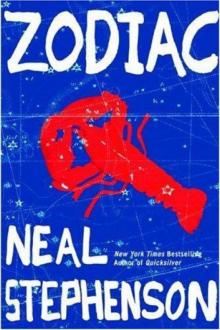 Zodiac: The Eco-Thriller
Zodiac: The Eco-Thriller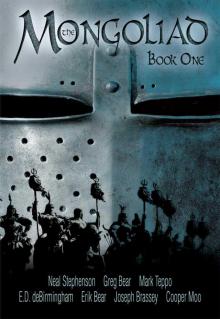 The Mongoliad: Book One
The Mongoliad: Book One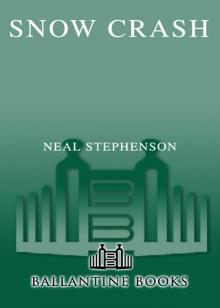 Snow Crash
Snow Crash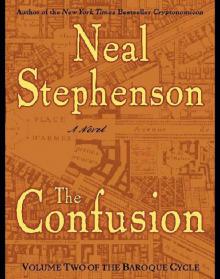 The Confusion: Volume Two of the Baroque Cycle
The Confusion: Volume Two of the Baroque Cycle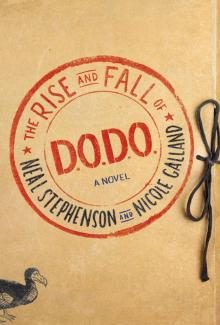 The Rise and Fall of D.O.D.O.
The Rise and Fall of D.O.D.O.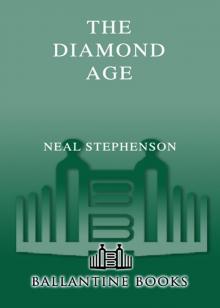 The Diamond Age: Or, a Young Lady's Illustrated Primer
The Diamond Age: Or, a Young Lady's Illustrated Primer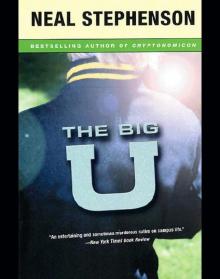 The Big U
The Big U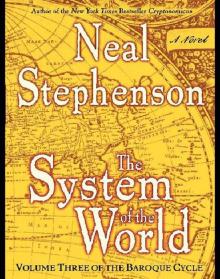 The System of the World: Volume Three of the Baroque Cycle
The System of the World: Volume Three of the Baroque Cycle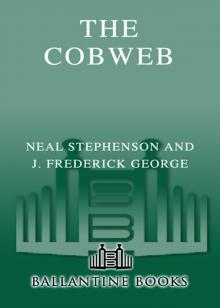 The Cobweb
The Cobweb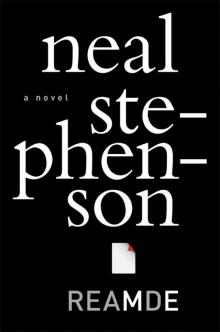 Reamde
Reamde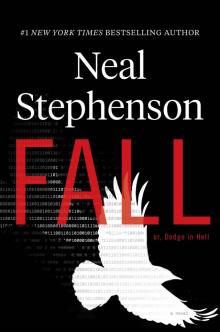 Fall; or, Dodge in Hell
Fall; or, Dodge in Hell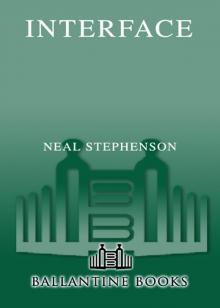 Interface
Interface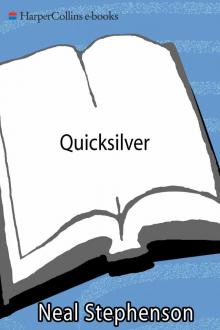 Quicksilver
Quicksilver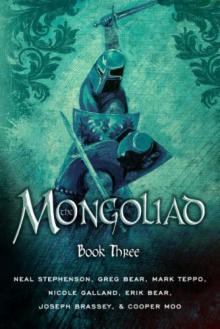 The Mongoliad: Book Three
The Mongoliad: Book Three Seveneves
Seveneves Atmosphæra Incognita
Atmosphæra Incognita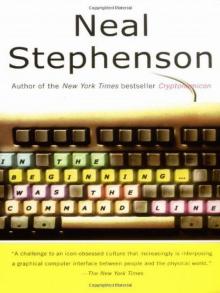 In the Beginning...Was the Command Line
In the Beginning...Was the Command Line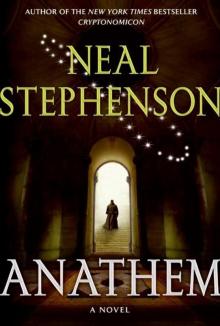 Anathem
Anathem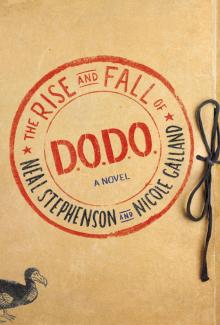 The Rise and Fall of D.O.D.O.: A Novel
The Rise and Fall of D.O.D.O.: A Novel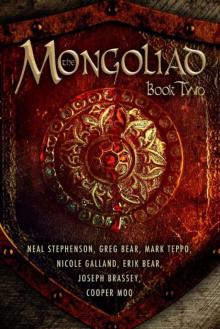 The Mongoliad: Book Two
The Mongoliad: Book Two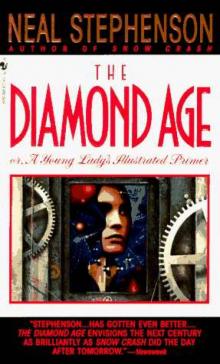 Diamond Age or a Young Lady's Illustrated Primer
Diamond Age or a Young Lady's Illustrated Primer THE System OF THE WORLD
THE System OF THE WORLD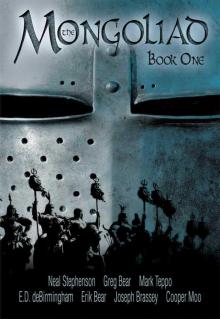 The Mongoliad: Book One tfs-1
The Mongoliad: Book One tfs-1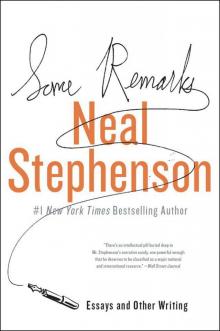 Some Remarks: Essays and Other Writing
Some Remarks: Essays and Other Writing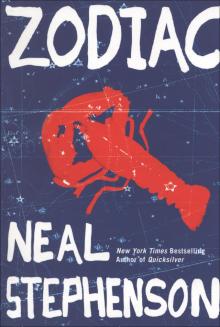 Zodiac
Zodiac Spew
Spew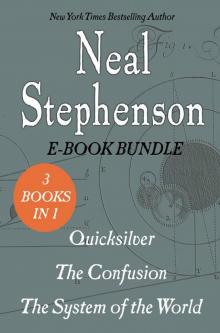 The Baroque Cycle: Quicksilver, the Confusion, and the System of the World
The Baroque Cycle: Quicksilver, the Confusion, and the System of the World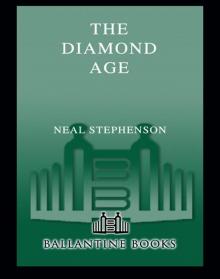 The Diamond Age
The Diamond Age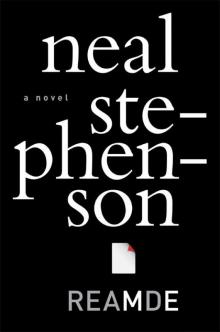 Reamde: A Novel
Reamde: A Novel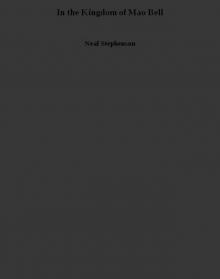 In the Kingdom of Mao Bell
In the Kingdom of Mao Bell Mother Earth Mother Board
Mother Earth Mother Board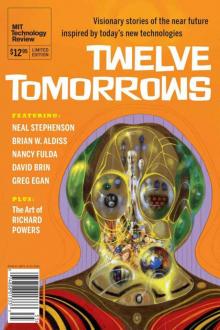 Twelve Tomorrows - Visionary stories of the near future inspired by today's technologies
Twelve Tomorrows - Visionary stories of the near future inspired by today's technologies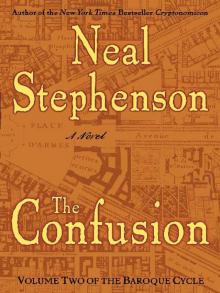 The Confusion
The Confusion The Great Simoleon Caper
The Great Simoleon Caper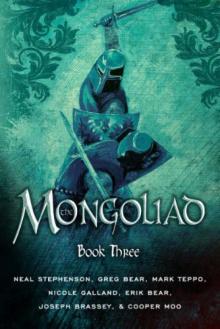 The Mongoliad: Book Three tfs-3
The Mongoliad: Book Three tfs-3